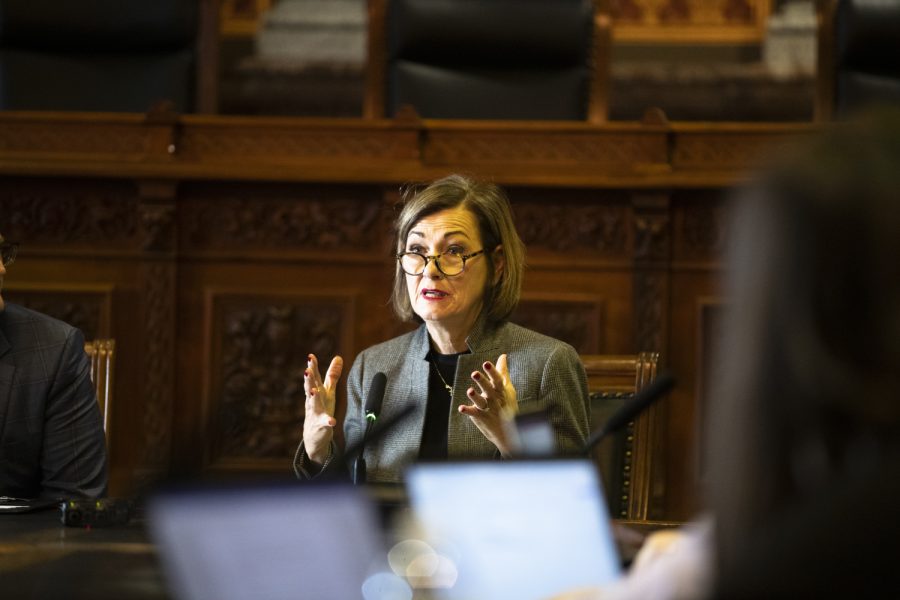Gov. Reynolds touts math and reading scores, rankings from national assessment
National Assessment of Educational Progress test shows that Iowa school scores decreased at a slower pace than the national average.
Iowa Gov. Kim Reynolds responds to a question asked by a reporter at a press conference at the Iowa State Capitol in Des Moines, Iowa on Tuesday, Jan. 4, 2022.
October 24, 2022
The National Assessment of Educational Performance, a national standardized test given to fourth and eighth graders to test reading and math performance, released the national and statewide averages and scores for 2022 on Monday, which showed a national decline in reading and math scores in both grades. Though Iowa also saw decreases, the state’s average scores ranked higher than the national average.
Many experts attribute the decrease to school closures at the beginning of COVID-19, including the Secretary of Education Miguel Cardona. Cardona said the scores were appalling and unacceptable in a call with reporters on Monday morning, according to National Public Radio.
“This is a moment of truth for education,” he said. “How we respond to this will determine not only our recovery but our nation’s standing in the world.”
However, Gov. Kim Reynolds attributed Iowa’s relatively high rankings and above-average scores to her push to reopen Iowa schools in the fall of 2020 after the outbreak of COVID-19 started in March 2020.
Many critics said Reynolds pushed to open schools too early, and were worried about the ongoing public health crisis.
The Iowa legislature passed a bill during its 2021 session that required all public school districts in Iowa to offer a 100 percent face-to-face learning program to all of their students. The bill still allowed the districts to offer remote learning if the family chooses.
Iowa was also ranked above the national average in 2019 in all categories. Iowa scores also decreased less than the national average between 2019 and 2022.
“Not to make headlines or for political gain, but because we believed it was the best thing to do for our children’s education, stability, and overall well-being,” Reynolds said in a press release Monday morning.
Iowa’s fourth-grade math scores decreased by one point between 2019 and 2022, but Iowa ranks 7th nationally in fourth-grade math scores and is five points above the national average. Iowa’s eighth-grade math scores decreased by four points from 2019 to 2022 — four less than the national average — and ranks 15th nationally.
Iowa’s reading scores in fourth grade decreased by three points since 2019 — on par with the national decrease — and is currently ranked 15th nationally for reading scores. Eighth-grade reading scores decreased by two points — one less than the national average — and ranked 20th nationally.
Reynolds said the hard work isn’t over yet and that lots of work still needs to be done to bring students back up to speed.
“While we still have work to do to improve educational performance in Iowa,” Reynolds said, “Our students are ahead of their peers across the country because we kept our schools open and gave parents the choice of what was best for their children.”
With Reynolds’ reelection bid this general election, she faces off against Deidre DeJear, a Democrat and small business owner from Des Moines, who has a starkly different idea on education policy.
DeJear has been critical of Reynolds’ education policy, opposing her bid to fund vouchers for private schools, which are for students attending public school and who qualify for the income guidelines, with public funds.
DeJear has also criticized Reynolds for Iowa’s relatively low reading scores with Iowa ranking 20th nationally in eighth-grade reading scores.




